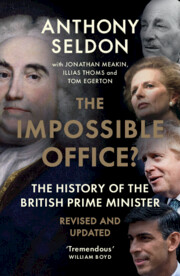82 results
Introduction: What Difference Do Governments Make?
-
-
- Book:
- The Conservative Effect, 2010–2024
- Print publication:
- 27 June 2024, pp 1-3
-
- Chapter
- Export citation
Frontmatter
-
- Book:
- The Conservative Effect, 2010–2024
- Print publication:
- 27 June 2024, pp i-vi
-
- Chapter
- Export citation
Index
-
- Book:
- The Conservative Effect, 2010–2024
- Print publication:
- 27 June 2024, pp 527-550
-
- Chapter
- Export citation
Conclusion: Fourteen Wasted Years? The Verdict
-
-
- Book:
- The Conservative Effect, 2010–2024
- Print publication:
- 27 June 2024, pp 508-525
-
- Chapter
- Export citation
Acknowledgements
-
- Book:
- The Conservative Effect, 2010–2024
- Print publication:
- 27 June 2024, pp 526-526
-
- Chapter
- Export citation
List of Contributors
-
- Book:
- The Conservative Effect, 2010–2024
- Print publication:
- 27 June 2024, pp ix-xvi
-
- Chapter
- Export citation
Contents
-
- Book:
- The Conservative Effect, 2010–2024
- Print publication:
- 27 June 2024, pp vii-viii
-
- Chapter
- Export citation
Chapter 1 - The 300th Anniversary Bookend Prime Ministers
-
- Book:
- The Impossible Office?
- Published online:
- 14 March 2024
- Print publication:
- 14 March 2024, pp 1-29
-
- Chapter
- Export citation
Contents
-
- Book:
- The Impossible Office?
- Published online:
- 14 March 2024
- Print publication:
- 14 March 2024, pp xi-xii
-
- Chapter
- Export citation
Chapter 7 - The Eclipse of the Monarchy, 1660–2024
-
- Book:
- The Impossible Office?
- Published online:
- 14 March 2024
- Print publication:
- 14 March 2024, pp 275-312
-
- Chapter
- Export citation
Preface
-
- Book:
- The Impossible Office?
- Published online:
- 14 March 2024
- Print publication:
- 14 March 2024, pp xiii-xviii
-
- Chapter
- Export citation
Chapter 6 - The Constraints on the Prime Minister, 1721–2024
-
- Book:
- The Impossible Office?
- Published online:
- 14 March 2024
- Print publication:
- 14 March 2024, pp 221-274
-
- Chapter
- Export citation
Chapter 4 - The Transformational Prime Ministers, 1806–2024
-
- Book:
- The Impossible Office?
- Published online:
- 14 March 2024
- Print publication:
- 14 March 2024, pp 112-168
-
- Chapter
- Export citation
Dedication
-
- Book:
- The Impossible Office?
- Published online:
- 14 March 2024
- Print publication:
- 14 March 2024, pp ix-x
-
- Chapter
- Export citation
Chapter 10 - The Impossible Office?
-
- Book:
- The Impossible Office?
- Published online:
- 14 March 2024
- Print publication:
- 14 March 2024, pp 389-428
-
- Chapter
- Export citation
Index
-
- Book:
- The Impossible Office?
- Published online:
- 14 March 2024
- Print publication:
- 14 March 2024, pp 527-550
-
- Chapter
- Export citation

The Impossible Office?
- The History of the British Prime Minister - Revised and Updated
-
- Published online:
- 14 March 2024
- Print publication:
- 14 March 2024
Chapter 2 - A Country Transformed, 1721–2024
-
- Book:
- The Impossible Office?
- Published online:
- 14 March 2024
- Print publication:
- 14 March 2024, pp 30-68
-
- Chapter
- Export citation
Copyright page
-
- Book:
- The Impossible Office?
- Published online:
- 14 March 2024
- Print publication:
- 14 March 2024, pp viii-viii
-
- Chapter
- Export citation
Acknowledgments to the First Edition
-
- Book:
- The Impossible Office?
- Published online:
- 14 March 2024
- Print publication:
- 14 March 2024, pp 429-433
-
- Chapter
- Export citation



